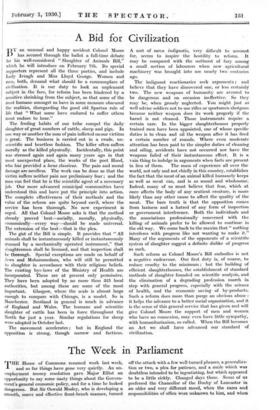A Bid for Civilization Y an unusual and happy accident
. Colonel Moore 11 has secured through the ballot a full-time debate for his well-considered " Slaughter of Animals Bill,'' which he will introduce on February 7th. Its special supporters represent all the three parties, and include Lady Iveagh and Miss Lloyd George. Women and men, both, demand what should be a commonplace of civilization. It is our duty to look an unpleasant subject in the face, for reform has been hindered by a sensitive shrinking from the subject, so that some of the most humane amongst us have in some measure obscured the realities, disregarding the good old Spartan rule of life that " What some have endured to suffer others must endure to hear."
The feeding habits of our tribe compel the daily slaughter of great numbers of cattle, sheep and pigs. In one way or another the sum of pain inflicted on our victims is great. The business_ is carried out in a crude, un- scientific and heartless fashion. The killer often Suffers morally as the killed physically. Incidentally, this point was stressed again and again many years ago in that Most unexpected plaCe, the works of the poet: Hood; who has provided a' locus dassien.i. The pain and moral dainage are needless. The work can be done so that the victim Suffers' neither:pain nor _Prelitninary fear ; and the roan can feel that he is the scientific agent_of a necessary job. Our more advanced municipal communities haVe understood this and have. put_the principle into action. The complete effectiveness of their methods' and the valne of the reforth are quite beyond cavil, where the service las been thorough. No new experiment is urged. All that Colonel Moore asks is that the method already' proved ' best socially, morally, physically, econernically-every way—should be made universal. The extension of the bestthat is the plea.
The gist of the Bill is simple. It provides that " All animals shall be instantaneously killed or instantaneously stunned by a mechanicallk operated instrument," that slaughtermen shall be licensed, and that inspection shall be thorough. Special exceptions are made on behalf of Jews and Mohammedans, who will still be permitted to slaughter in accordance with their religious beliefs. The existing bye-laws of the Ministry of Health are incorporated. These are at present only permissive. They have been adopted by no more than 325 local authorities, but among these are some of the most important. Glasgow, where the scale is almost large enough to compare with Chicago, is a model. So is Manchester. Scotland in general is much in advance of England and Wales. The humane and scientific slaughter of cattle has been in force throughout the North for just a year. Similar regulations for sheep were adopted in October last.
The movement accelerates ; but in England the opposition is strong, though narrow and factious. A sort of saeva indignatio, very difficult to account for, seems to inspire the hostility to reform. It may be compared with the outburst of fury among a small section of labourers when new agricultural machinery was brought into use nearly two centuries ago. • The indignant reactionaries seek arguments ; and believe that they have discovered one, or less certainly two. The new weapons of humanity are averred to be dangeroas and on occasion ineffective. So they may be, when grossly neglected. You might just as well advise soldiers not to use rifles or sportsmen shotguns because neither weapon does its work properly if the barrel is not cleaned. Those instruments require a certain care. In the bigger slaughterhouses properly trained men have been appointed, one of whose specific duties is to clean and oil the weapon after it has fired a certain number of rounds. Where even moderate attention has been paid to the simpler duties of cleaning and oiling, accidents have not occurred nor have the weapons failed of their instantaneous effect. It is a Vain thing to indulge in arguments when facts are present in lieu of them. The mass of experience all over the world, not only and not chiefly in this country, establishes the fact that the meat of an animal killed luimanely keeps as well as meat can, and is as sound and wholesome. Indeed, many of us must believe that fear, which at Once affects the body of any sentient creature, is more likely than any other cause to affect the quality of the meat. The bare truth is that the opposition comes from laziness and a hatred of any form of inspection or government interference. Both the individuals and the associations professionally concerned with the killing of animals prefer to be allowed to continue in the old way. We come back to the maxim that " nothing interferes with progress like not wanting to make it." Many of the arguments of the opponents of a scientific system of slaughter suggest a definite dislike of progress as such.
Such reform as Colonel Moore's Bill embodies is not a negative endeavour. Our first duty is, of course, to reduce cruelty to the minimum ; but the building of efficient slaughterhouses, the establishment of standard methods of slaughter founded on scientific analysis, and the elimination of a degrading profession march in step with general progress, especially with the science of health, and the economic saving of by-products. Such a reform does more than purge an obvious abuse : it helps the advance to a better social organization, and it is the sense of this general service that has given and will give Colonel Moore the support of men and women who have no connexion, may even have little sympathy, with humanitarianism, so called. When the Bill becomes an Act we shall have advanced our standard of civilization.






































 Previous page
Previous page